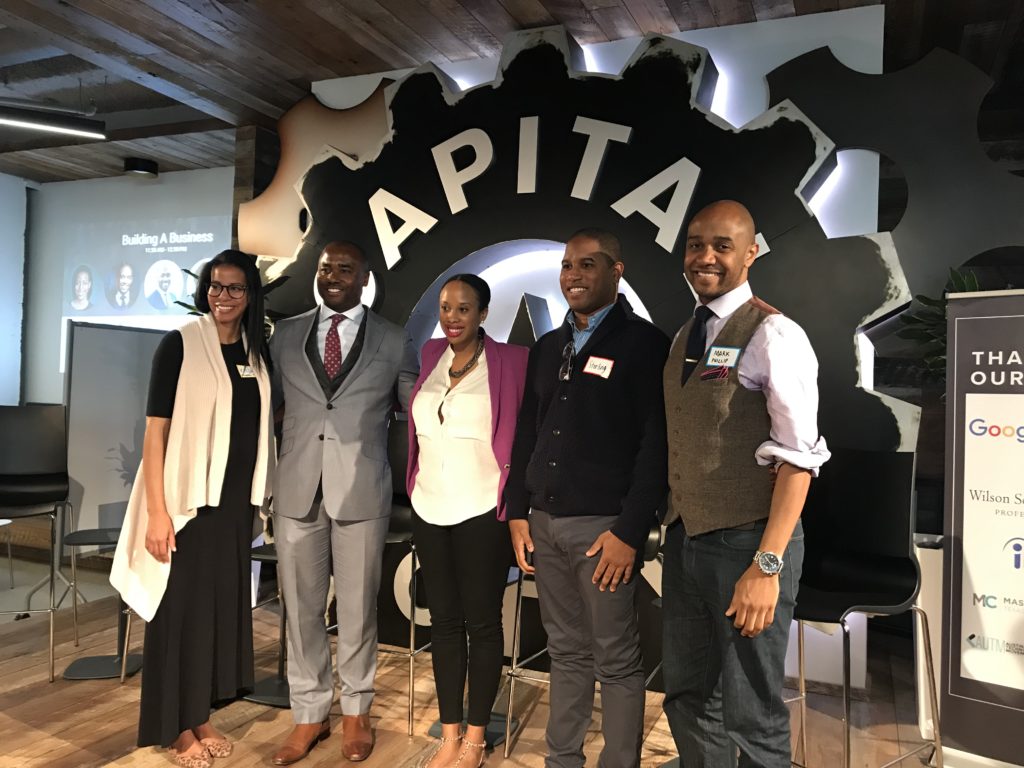
By LAURA LOREK, Publisher of Silicon Hills News
The biggest problem Mark Phillip encountered in building a technology business in Austin was finding funding.
The founder and CEO of Are You Watching This, a sports data and analytics company, got told no by everyone, he said. Phillip spoke on the “Building a Business” panel at the Black in Tech Summit at Capital Factory last Thursday.
“I’m glad that it happened now but I wasn’t happy about it then,” he said.
In the early days, Phillip spent $7,000 a month on data and ran his credit score down to zero because he financed his company with credit cards. But being able to get through that and get to profitability through bootstrapping was a huge accomplishment, Phillip said.
Phillip has a competitor in the Bay area that is backed by venture capital. He said going toe to toe with the competitor, forced him to build a company he could run by himself with better technology. Phillip has a patent for excitement analytics that was awarded in 2016.
Today, Are You Watching This is profitable, Phillip said. He runs the business out of his office at WeWork on Congress in downtown Austin. Its customers include Bleacher Report, CBS Sports, Comcast, Golf Digest and Sportradar.
But it hasn’t been easy to watch the changes in Austin and the success of the tech community drive members of the black community further out of town, he said. Phillip moved here from Baltimore 18 years ago for a job with the intention of staying for a few years, but he never left.
Austin has undergone tremendous growth in the last two decades and because of its booming tech community, the city likes to look down its noses at the rest of Texas, Phillip said.
“We’re the cool kids, but we’re still the most socioeconomically segregated city in the country,” Phillip said. “We still have one of the smallest black populations in the state.”
Austin’s population is 7.6 percent black, according to 2018 stats from the U.S. Census Bureau. But gentrification and the growth of the tech industry in East Austin continues to displace longtime residents. Many of those residents have moved further north to Pflugerville.
It’s sad to see Facebook groups where everyone new ends up in Pflugerville because that’s where they have to be, he said.
“We fix it here, we fix it with connections,” Phillip said.
Allies and stakeholders in Austin, who are not black, who are focused on diversity are helping said Sterling Smith, founder of Launch Partner and Sandbox Commerce.
For example, Stephen Straus in Austin created the Startup Diversity and Inclusion Pledge in 2017 to help women and people of color get access to jobs, venture funding and opportunities in the technology industry, Smith said.
A.J. Bingham, who founded The Bingham Group, a law firm specializing in lobbying two years ago, grew up in Austin and graduated from the Liberal Arts and Science Academy, a magnet school at LBJ High School. He said he’s used to the lack of diversity in places like the Texas State Capitol, but he doesn’t let it deter him from going after what he wants.
Bingham became the first president of color of the Young Men’s Business League of Austin, one of the oldest social service organizations in Austin, founded in 1913. He’s also the only black person on the Long Center board of trustees. He said once a black person gets on
Panelists also talked about other challenges they have encountered building businesses.
Resiliency is necessary because being an entrepreneur is a roller coaster ride, said Lauren Washington, co-founder Black Women Talk Tech and Fundr.
Surround yourself with others who are going through the entrepreneurial journey, Washington said.
It’s important to be around people who understand what you’re going through, she said.
Also, hiring is
“It’s a really tough thing to find in a person,” Washington said.
It’s also important to fire fast, she said.
For entrepreneurs just getting started, Phillip advises them to create a monthly newsletter to share with supporters. It provides accountability and can keep an entrepreneur on track, he said.
“When you are first getting started it’s a critical thing to do,” he said.
